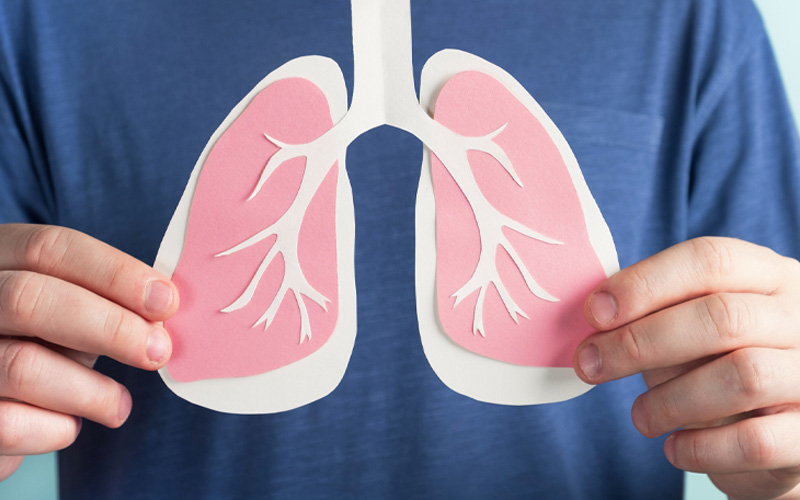
Imagine receiving a lung cancer diagnosis even though you’ve never smoked a day in your life. It’s an unfortunate reality for thousands of people every year, including individuals right here in Bucks and Montgomery Counties.
Research shows that non-smokers and never-smokers account for anywhere between 10% to 20% of lung cancer cases annually. Lung cancer in never-smokers occurs more often in women and starts at an earlier age than lung cancer in smokers.
Yet there are ways people can reduce their risks for lung cancer, whether or not they’ve smoked. Let’s explore the top lung cancer risk factors for non-smokers and share some tips and tests you can use to lower your risks right now.
Non-smoking causes of lung cancer
1. Secondhand smoke
Secondhand smoke occurs when an individual breathes in smoke from tobacco products like cigarettes, cigars, hookahs or pipes. It’s dangerous because tobacco smoke contains many toxins, including benzene, butane, ammonia, toluene, cadmium and hydrogen cyanide, and there is no “safe” level of exposure. For these reasons, secondhand smoke is the second-leading cause of lung cancer, responsible for about 7,300 cases each year, according to the Centers for Disease Control and Prevention (CDC).
2. Radon exposure
Radon is an odorless, colorless and tasteless gas that seeps from the ground and into buildings. About 40% of all Pennsylvania homes have radon levels that are higher than the Environmental Protection Agency’s (EPA) action guidelines of 4 picocuries per liter. Bucks and Montgomery counties are considered by the EPA to have the highest potential for elevated radon levels. Radon is responsible for about 2,900 lung cancer cases each year, says the CDC.
3. Occupational exposure
Workers who are exposed to high levels of cancer-causing agents like asbestos, arsenic and diesel fuel exhaust may have an elevated risk for lung cancer. Asbestos exposure can also cause mesothelioma, a rare and aggressive cancer that affects the linings of the lungs, stomach, heart and other organs.
4. Air pollution
Tiny particles in the air from traffic and industrial emissions can lead to an increased risk for lung cancer. Many of these risks occur in high-population areas.
5. Family history and genetics
If your parents or siblings had lung cancer, you may be at higher risk for the disease. This can be especially true if members of your family smoked tobacco products in the same house as you. Additionally, lung cancer is linked to certain mutations of the epidermal growth factor receptor (EGFR) gene.
Lung cancer symptoms in non-smokers
The symptoms of lung cancer in non-smokers are the same as in people who smoke. If you feel tired all the time, cough frequently, cough up blood, or experience chest pain, wheezing or shortness of breath, it’s wise to make an appointment with your primary care provider and discuss your symptoms.
How never-smokers can prevent lung cancer
Anyone can lower their risk for lung cancer by taking these smart steps:
- Test your home for radon. Test kits are available at local hardware stores and cost between $20 to $30. Or you can have a professional radon testing company run a test.
- Reduce your exposure to secondhand smoke. If you live in a home with smokers, ask them to smoke outside and not indoors.
- Switch up your diet. Eat a variety of fruits, vegetables, whole grains and legumes, all of which have vitamins and minerals that can reduce the risk for many types of cancer.
Where to find lung cancer screening and care locally
If you currently smoke — or if you smoked at any time in your life — you may qualify for a lung cancer screening. This test is a low-dose CT scan that looks for tiny spots on the lung called nodules that X-rays can’t see. Anyone between age 50 and 80 who formerly or currently smoked and has a 20-year or greater “pack year” history is eligible for screening.
To calculate your pack year history, take the number of packs of cigarettes you smoke per day and multiply it by the number of years smoked. For example, someone who smoked 2 packs a day for 10 years would have a “pack year” history of 20 years (2 x 10 = 20),
Lung cancer screening is available locally at Grand View Hospital and the Harleysville Outpatient Center. Ask your doctor for a referral.
If you’ve never smoked, experts do not recommend lung cancer screening. However, you should still talk with your primary care provider about your personal risk for lung cancer, especially if you have any of the risk factors listed above.
If you need care for lung cancer, Grand View Health’s Cancer Program includes a team of specialists who are skilled at evaluating, diagnosing and treating patients with multiple lung conditions, including cancer. Our cancer program is also a member of the Penn Cancer Network. Learn more.
